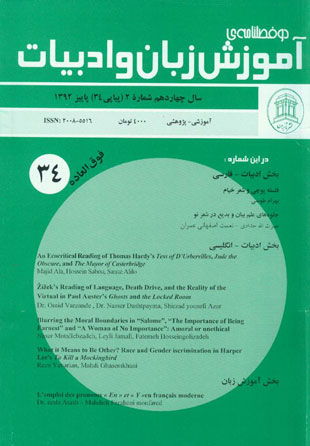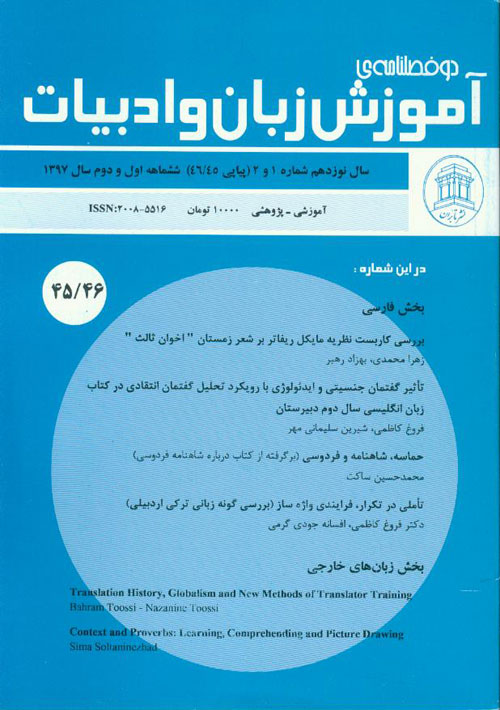فهرست مطالب

دو فصلنامه آموزش زبان و ادبیات
سال چهاردهم شماره 2 (پیاپی 34، پاییز 1392)
- فوق العاده
- 116 صفحه، بهای روی جلد: 40,000ريال
- تاریخ انتشار: 1392/09/20
- تعداد عناوین: 7
-
Pages 1-10Reading Hardy’s novels with an eye to nature and its impact on the characters and incidents can be an illuminating process by which the reader’s appreciation of the work would increase. His novels provide a special opportunity for exploring the nature’s influence on human beings. The subject matter might be of interest to those inspecting the psychology of Hardy’s imaginary world of Wessex which is delineated in his works. The purpose of this study is to shed light from a new perspective to Hardy’s novels in order to elucidate the affect of physical and social nature on the destiny and psychology of the characters. For this end, the researcher has used different critical source materials to back up her own reading of Jude the Obscure, Tess of the dUrbervilles and The Mayor of Casterbridge for exploring the role of nature in shaping human nature, class and gender. Hardy’s strong belief in nature having the upper hand over the lives of the people is detected to be responsible for his well-known pessimism which drives most of his protagonists to their ultimate doom. The close examination of the novels indicated that natural world, i.e. external phenomenon, is beyond the characters’ control and shapes their destiny, leading them to their gloomy and tragic ending.Keywords: naturalism, determinism, ecocriticism, control, nature, class, gender
-
Pages 11-32The issue of language and its obfuscating structure is of crucial importance for centuries among mostly all those thinkers who contributed to elucidate this enigmatic issue. Many thinkers agreed to disparage language structure because of its subjugating manner. Of such thoughtful men, one may begin with Plato, Lacan, Derrida, and now Žižek’s aphorisms concerning the unreliability of language. Slavoj Žižek, in a pedantic method stultifies the way modern enlightenment brainwaves have started to decipher the issue of language, and does not accept their excuse to subterfuge the main predicaments with language. Virtuality in Žižek’s parlance is not the hackneyed concept of Virtual Reality, it is, to wonder of many, the reality of the virtual; to accept the truism, for Žižek of course, that our everyday life realities, in order to remain palpable and authentic, has to be virtual. Death drive, as Freud first proposes it, is the inculcating point in Žižek’s books, in a way to render the fact that the intruder in self has long transgressed the death-life cycle. Paul Auster, the postmodern novelist, has deployed language sardonically in Ghosts and The Locked Room. In these two novellas, language is presented as a parasite which does not contribute to communication among the characters; it alienates them from their own words.The belligerent egos are virtual in these two novels that is, they are more palpably threatening than any real and literal threat. Unlike any entity, these intruding others are no longer commitment to their very death-life cycle. In the present paper, a Žižekian reading of the characters, Blue in Ghosts and the unnamed narrator in The Locked Room is to be expatiated.Keywords: reality of the virtual, death drive, desire, partial object, language
-
Pages 33-48Late nineteenth-century’s society was an anxious one feared more and more the threat of degeneration. The idea of degeneration brought together a cluster of ideas about moral corruption, racial impurity, lack of sanitation among the working classes, and, most controversially of all, homosexuality. All sorts of books pertaining to degeneration were published from the 1880s onwards. The Wilde trials took place in a climate when nearly every periodical carried an article on Nordau’s opinions, discussing how degeneration could be found in many novels of the day. What finally landed Wilde in trouble was his style, where each axiomatic phrase inverts the original wise saying upon which it is based. Such sayings were cited as evidence against him in court, and so, in a sense, they were partly responsible for sending him to jail. The way articles could put novelists and intellectuals so briskly defenseless indicates just how tense feelings had grown between an upstanding Victorian morality and a more modern permissiveness. This paper aims to find the anti-Victorian voice in his works, a voice not intended to popularize immorality through his works; although they were perceived as if they were. By standing against the accepted norms of his society he questions the normality and acceptability of the society’s rules. He doesn’t accept the prohibitions of the unwritten rules, even it could be argued that he was accepting the moralities but with different set of rules or in other words ethics.
-
Pages 49-56Images of self and other are best understood not as static categories, but as fluid and dynamic negotiations in cultural encounters and transformations. Lee provides an example of cultural identity constructed in a context of oppression and discrimination. This identity is created largely through explicitly contrasting black cultural practice with that of white in American society. This paper aims to examine how a history of racialization impacts the identity formation of characters in this novel. Moreover, the oppression that the black people suffered through being put in Other's position and white's mistreatments and exploitations and also the ways in which race often functions as an ineffective marker of group homogeneity will be examined.Keywords: Self, Other, Cultural Identity, Hybridity, Stereotyping
-
Pages 59-70The grammar of each language is a matter of difficulty & discussion & the specialist's effort is to facilitate & shade these barriers, so that individuals be able to know the correct order of words to speak & write property. These matters arent apart from what linguistics do. With innovations in this field we will face changes in grammar. One of the points which is hard for French learners to internalize is the proper usage of "Y" & "En". Here we are going to discuss this matter in details.


